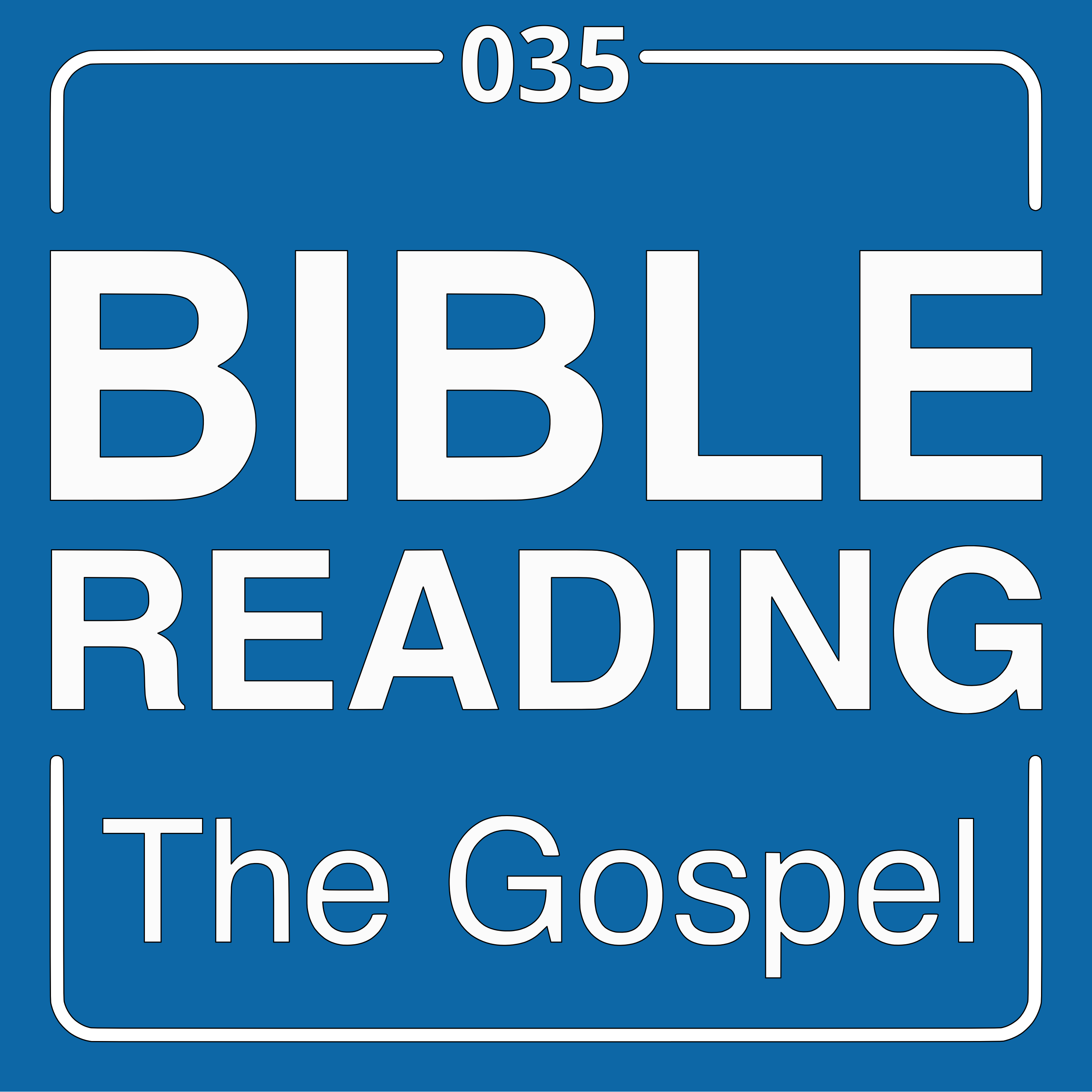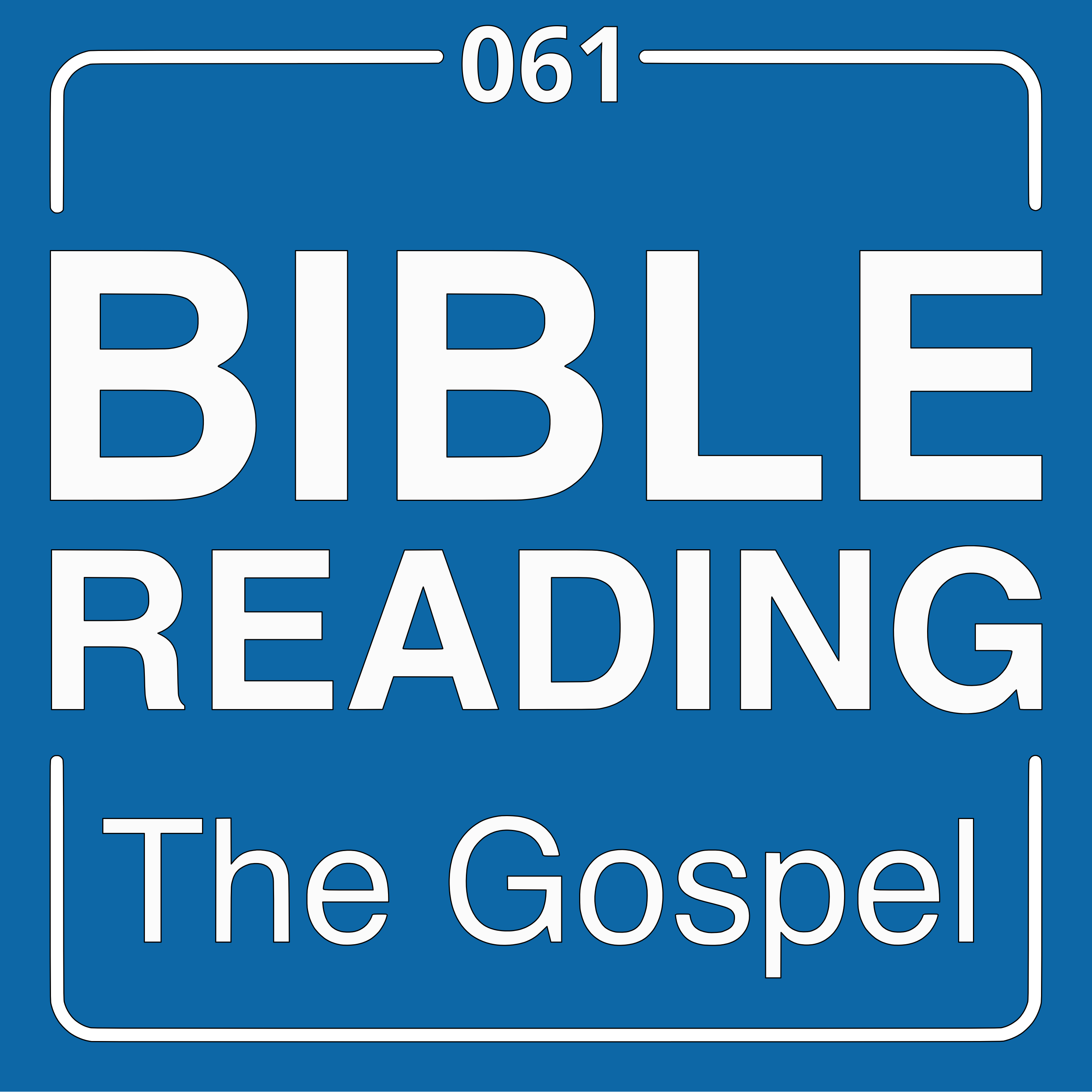Episode Transcript
[00:00:00] Speaker A: Foreign.
Hello, I'm Josh.
[00:00:24] Speaker B: And I'm Gabriel.
[00:00:26] Speaker A: And today on reading the Gospel, we are studying the event Peter's denial of Jesus. This is found in all four Gospels. We can read it in Matthew, chapter 26, verses 69 through 75, in Mark, chapter 14, verses 66 through 72, in Luke, chapter 22, verses 54 through 62. And finally, we can read this in John, chapter 18, verses 15 through 27. Today we're going to be reading in the book of Matthew, chapter 26. Join us as we start at verse 69.
[00:01:15] Speaker B: Now, Peter was sitting outside in the courtyard, and the servant girl came up to him and said, you also were with Jesus the Galilean. But he denied it before them all, saying, I do not know what you mean.
And when he went out to the entrance, another servant girl saw him and said to the bystanders, this man was with Jesus of Nazareth.
[00:01:41] Speaker A: And again, he denied it with an oath, I do not know the man. After a little while, the bystanders came up and said to Peter, certainly you are one of them, for your accent betrays you. Then he began to invoke a curse on himself and to swear, I do not know the man. And immediately the rooster crowed. And Peter remembered the saying of Jesus, before the rooster crows, you will deny me three times. And he went out and wept bitterly.
This story here is a shocking story.
Jesus tells Peter only a few hours before.
And it seems like in the readings that Peter doesn't realize he's doing it until the rooster crows. Yeah, how's that possible?
[00:02:43] Speaker B: We many times are caught into that moment and there is something intense. We are emotional human beings and we react. Sometimes we speak before we think. And those quick gut reactions disconnect us from the context, from the backdrop, from other previous conversations. We didn't see the big picture. And the purpose of the rooster was to remind him everything, who he was, who Jesus is, the previous conversations, the big picture.
[00:03:25] Speaker A: So if he had been stabbed and died before the rooster crowed, does that mean he's not going to heaven?
[00:03:37] Speaker B: Well, our relationship with God might have ups and downs, but what is very important is the direction in which we are moving. And based on the end of this passage, that he went out and wept bitterly. He wept about the weakness of human nature, how strong he felt he was the day before, and how weak was this time.
I think in the day of judgment, God will decide based on the direction of our actions, based on the relationship that we had with God. Of course, sometimes we make one step forward and two steps backwards. But our goal is forward.
And over time we move in that direction.
[00:04:30] Speaker A: Yeah. And you know, we're saved by the death of Jesus Christ and accepting that gift, that that's how we're saved.
What happens up in heaven when. When our names come up in the judgment, they look through the book of remembrances, they look through the book of life and see, okay, he claimed he was saved.
Is there evidence, Is there evidence that the fruit of the Spirit is in his life? Is there evidence that. That his life was changed by beholding? Because the Bible says by beholding we become changed. The Bible says he who began a good faith work in us will be faithful to complete it. So someone who's saved should have evidence of that in their life.
[00:05:18] Speaker B: God will not judge us based on the last action, you know, seconds before dying.
Also, God will not decide our final destiny based on the top 10 best works in life or spiritual achievements or based on the top worst decision.
God will decide our destiny based on our profession. Right. That we want to be in heaven and we accept Jesus Christ death. And also if there is evidence that we move in that direction.
[00:05:58] Speaker A: Yeah. And so it is at the second coming of Jesus where the Bible says the corruptible puts on incorruption. Right. It's at that point that we're changed in a moment, in the twinkling of an eye. And so as Christ followers, we should not be surprised when we realized that we found ourselves in a situation like Peter is in.
It doesn't excuse it. It doesn't make it okay. It doesn't give us hall pass or a free card to do bad things.
But we shouldn't be shocked to the point of despair.
[00:06:41] Speaker B: Despair, because that is what Satan wants. He wants to discourage us, eventually to destroy us. We should look at each situations like this, like Peter's denial, like a teaching moment, like a teaching experience used by God to help us realize who we are, what weaknesses do we have and how much we should trust God even more in any situation and beforehand.
[00:07:11] Speaker A: Yeah. And I find in my life, when I'm coming up against something that I'm struggling with, I know God doesn't want me to do that thing, but my heart desires it.
My prayer is, God, change my heart.
Make me someone who doesn't want to. If you don't want me doing this, make me a person who doesn't want to do that. And it takes time, but he starts doing that, he starts changing who I am and makes me not desire those things.
[00:07:42] Speaker B: Sometimes God waits until we fail so we can be in agreement with his plan for us, like the Prodigal Son or Peter or other experiences in our lives.
And when we realize the need, that is when we commit our life, our hearts, our minds completely to Him. And that is when he can change us.
[00:08:07] Speaker A: Yeah. Just to be clear, God does not make us fail.
[00:08:11] Speaker B: Yes.
[00:08:11] Speaker A: But when we do fail, he uses that. And so here in Peter's situation, we have kind of put out for the world to see the progression of sin. Because the very first question that was asked, you also was with. Were with Jesus the Galilean. And Peter's response could be seen as maybe even a white lie.
I don't know what you mean.
And if he was tried in court, you know. Well, I was just saying I didn't understand the question. I didn't hear her right. You know, you could make up anything, weasel out of I don't know what you mean without saying, I deny Christ. Right. So I view this first response as kind of a white lie. Not. He's not outright denying Christ. I don't know this man. He's just. I don't know. Right.
And then the second one, he is asked, this man was with Jesus of Nazareth.
And now Peter, it's more than the white lie.
It's, I don't know the man.
And this is a lie.
So he. He is now lying, bearing false witness.
[00:09:34] Speaker B: And this accusation or question doesn't come from one of the leaders of the nation or from a Roman soldier. It comes from a servant girl. Both the first one and the second one, those were, you know, working outside, maybe bringing like a cup of water or hot tea to people outside.
[00:09:56] Speaker A: Exactly. And then finally a bystander comes up and says, certainly you. You are one of them. For your accent betrays you. He's not saying that, you know, I saw you there. He's just, you speak northern. You have the Galilean accent. You're betrayed.
[00:10:13] Speaker B: You're not from here.
[00:10:14] Speaker A: Yeah. You're not from around here, and that betrays you. And here we have Peter cursing. I do not know the man.
That is beyond lying.
[00:10:26] Speaker B: It seems like he used some derogatory words or inappropriate words that would have been banned for the television today.
[00:10:35] Speaker A: Well, and I think for me, the way I look at it is more.
Oh, there was a saying we said as a kid, like, stick a needle in my eye. Like, if I'm lying, you can poke a needle in my eye. That's like the curse that if what I'm saying is wrong, then let the boulder fall down the mountain and crush the House, kind of. That kind of curse. That's what I imagine here, is that Peter is saying, if what I'm saying is false, allow this bad thing to happen to me.
Regardless of whether it was a swear word or whatever. This takes the denial of Christ to the next level.
And it is that point that the rooster crows.
And I think there's a couple lessons for us here. One, whenever the rooster crows for us, you know, it's that time that we realize, oh, wow, I'm not doing what I should be doing.
We can get up and leave. We can stop going down that path and continuing to disobey God or hurt him. We can get up and leave.
[00:11:49] Speaker B: Can you think about a couple of practical ways for us to identify the rooster crowing?
[00:11:57] Speaker A: I know for me, it's my conscience.
I get this sense that, oh, God would not be happy with me. God does not want me to do that.
[00:12:10] Speaker B: There is a physiological response to that. The heartbeat goes up, the breathing is more intense. We feel that something is wrong, and we become aware of that because hopefully we listen to our body. If something is not clear in my mind, is not the will of God. Better stay away until I get clarity about that.
[00:12:33] Speaker A: Yeah. And again, getting back to the types of sins we have, the sin of ignorance. Our body doesn't physically change when we don't know we're sinning. We have the sin of accident. You know, we're not. We're trying to go straight and we mess up. But it's that parabasis, that outright rebellion against God. That's what messes us up. That's what changes us, because we know that we shouldn't be doing it.
[00:13:01] Speaker B: So are there other ways for us today in 21st century to deny Jesus Christ?
And I'm asking this question because Peter's experience is somehow related to one of the commandments that says you should not bear false witness against not only your brother, but against God.
And I'm wondering if instead of saying something, something wrong or denying, Peter would have remained mute. No answer.
Would that have been acceptable to God?
Is it enough not to deny God? Or we have to go further than that?
[00:13:46] Speaker A: Yeah, I think it goes further than that. It's not just the, I do not know him. It's the, like we said, the white lie, like, I didn't hear you. Or ignoring the question or deflecting and not answering the question.
But I think it goes beyond that. It's our actions. Are we denying the power of God by not surrendering, by not seeking to be better? People are we denying the work that God wants to do in us.
And so we can deny in many different ways. It doesn't have to be a spoken word in our actions.
Sometimes what is driving us away from God is not listed in the Bible as a sin.
But I know in my heart when I am being drawn further away from God and it's those times that we need to come back and ask for forgiveness. Let's pray. Father, we are thankful for this story in the Bible that Peter was an example for us. That when we find ourselves drifting away from you and denying you that we can have hope.
[00:15:09] Speaker B: Amen.
[00:15:10] Speaker A: Of forgiveness.
That in the very moment we can run away from the situation.
And I thank you Father that in my life I have seen Jesus step in and intervene. And so we ask that we'll call in the name of Jesus when we feel like we cannot avoid sin in our lives.
And we ask that you will intervene in Jesus name. Amen.
[00:15:35] Speaker B: Amen.



